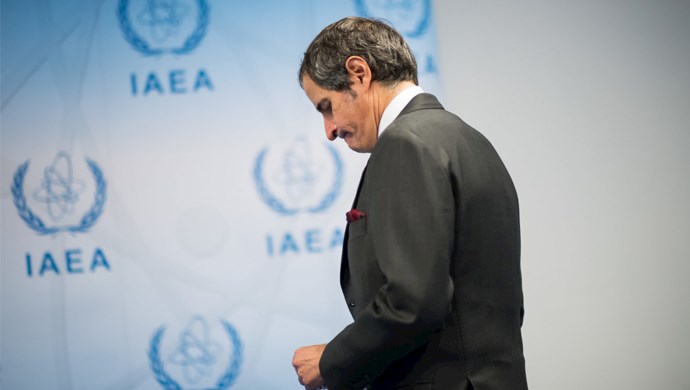Analysis by PMOI/MEK
Iran, September 9, 2021—As world powers try to find a solution to Iran’s nuclear impasse, Tehran continues to show lack that it has no interest in resolving its controversial program.
On Tuesday, International Atomic Energy Agency (IAEA), presented two reports that confirm Iran’s regime refusal to provide satisfactory answers to a probe into its past nuclear activities. The UN’s nuclear watchdog agency also said Tehran is obstructing the important monitoring work of international inspectors.
The IAEA further warned that the regime now has 10 kilograms of uranium enriched at 60 percent, which is near-weapons grade. The regime is also stockpiling more than 80 kilograms of 20 percent enriched uranium. Under the terms of the 2015 nuclear deal, formally known as the Joint Comprehensive Plan of Action (JCPOA), Iran’s regime is not allowed to enrich uranium above 3.5 percent.
The IAEA also warned that its verification and monitoring activities have been “seriously undermined” since February by Iran’s refusal to let inspectors access IAEA monitoring equipment. Some of the monitoring equipment need regular maintenance.
The latest report shows an escalation of provocative behavior by the Iranian regime. In February, IAEA inspectors confirmed that the regime had produced 3.6 grams of uranium metal at the Isfahan nuclear plant. The regime claims that it needs highly enriched uranium for civilian purposes. But the European members of the 2015 nuclear deal, formally known as the Joint Comprehensive Plan of Action (JCPOA), expressed “grave concern” over the production of uranium metal and say that Tehran has no civilian need for it. They described the move as a “key step in the development of a nuclear weapon.”
In June, during the convention of the IAEA board of governors, IAEA Director General Rafael Grossi warned, “The lack of progress in clarifying the agency’s questions concerning the correctness and completeness of Iran’s safeguards declarations seriously affects the ability of the IAEA to provide assurance of the peaceful nature of Iran’s nuclear program.”
In another report in August, Grossi said that his inspectors had confirmed that Tehran has produced 200 grams of uranium metal enriched up to 20 percent.
The escalation has accumulated as parties to the JCPOA gathered for several rounds of talks in Vienna to bring the Iranian regime back in compliance with the deal. The latest round ended in June, before the regime’s sham presidential elections.
Meanwhile, regime officials are continuing to show a lack of respect for international norms and their obligations.
In July, the regime’s outgoing president Hassan Rouhani said, “Iran's Atomic Energy Organisation can enrich uranium by 20% and 60% and if one day our reactors need it, it can enrich uranium to 90% purity.”
In late August, Ebrahim Raisi, the regime’s new president, appointed Mohammad Eslami as the new head of the Atomic Energy Organization of Iran (AEOI). Eslami is deeply tied to the Revolutionary Guards (IRGC), the military body that controls the regime’s nuclear weapons program. He was among a small group of IRGC officials that kickstarted the atomic bomb efforts in a meeting with A. Q. Khan, the “father of Pakistan’s nuclear program.”
And the regime’s new foreign minister, Hossein Amir Abdollahian laid out the regime’s plan to continue to dither and delay by saying last week that it will take “two to three months for the new administration to establish and do planning for any sort of decision” on continuing negotiations over its nuclear program.
As centrifuges continue to spin in Iran’s nuclear facilities, Tehran’s counterparts are starting to acknowledge that their diplomatic efforts have failed.
On Wednesday, U.S. Secretary of State Antony Blinken said in a press conference, “[We] are getting closer to the point at which a strict return to the compliance with the (nuclear deal) does not reproduce the benefits that that agreement achieved.”
The regime is trying to force its counterparts to provide it with unilateral concessions and sanctions relief without taking any steps to prove it is a trustworthy negotiation party. But if past is prologue, this regime has shown time and again that concessions will only encourage it to aggravate its provocative behavior.
In July, speaking at the Free Iran World Summit, Mrs. Maryam Rajavi, the president-elect of the National Council of Resistance of Iran (NCRI), warned about any concessions to the Iranian regime on its nuclear program.
“While the regime has been hiding its nuclear program by deceiving the world, the international community has been trying to stop or curb this project by granting concessions or by showing complacency,” Mrs. Rajavi said and emphasized that “any agreement that does not completely close down the regime's bomb-making, enrichment and nuclear facilities is unacceptable. And the Iranian people will not accept it.”





